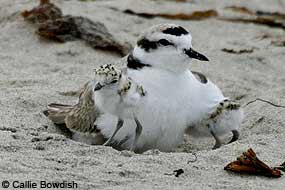|
You are viewing ARCHIVED content published online before January 20, 2025.
Please note that this content is NOT UPDATED, and links may not work. For current information,
visit https://www.nps.gov/aboutus/news/index.htm.
Contact: John Dell'Osso, 415-464-5135

A short stretch of the Great Beach will be temporarily closed to protect nesting snowy plovers from Friday, July 3 through Sunday, July 5. The closure will be established between North Beach parking lot and the mouth of Abbotts Lagoon. Temporarily closing a portion of the Great Beach will minimize disturbance to nests, chicks and breeding adults during this critical time. The closure over the busy holiday weekend will help chicks stay warm, have enough food and stay hidden from predators. The federally-threatened western snowy plover nesting season is underway. Nesting inconspicuously between the tidal zone and upper reaches of coastal beaches, snowy plovers on the West Coast are faced with habitat loss, disturbance and predation, all of which have taken a toll on this species. Point Reyes National Seashore, one of the few remaining nesting grounds for this rare bird, typically supports 15 to 30 adult breeding plovers. In partnership with the Point Reyes National Seashore Association and Point Blue Conservation Science (formerly PRBO Conservation Science), the snowy plover population has been monitored annually since 1995. "Following a significant low point in 2012, the number of plovers coming to Point Reyes to nest is slowly increasing. However, we still have big gains to make in actual nesting success," stated park ecologist David Press. "We appreciate everyone's support for these temporary closures to ensure a successful 2015 nesting season." In addition to the July 4 weekend closure, the portion of the Great Beach from the intersection of Kehoe Beach trail and Kehoe Beach to the North Beach parking lot (as signed) is closed annually to dogs from March 1 through September 30. As alternatives for park visitors with dogs, other popular beaches such as east Limantour Beach (to the left as you approach the beach) and Kehoe Beach remain open. All dogs in the park are required to be on a leash no longer than six feet. Check-in at any visitor center for current information. Further efforts to protect the plovers include seasonally roping off breeding habitat on upper sections of beaches and the construction of "exclosures" around their nests immediately after an egg is laid. Exclosures are erected at the nest site and made of wire fencing. Plovers have easy access in and out of the wire mesh but the eggs are protected from disturbance and predators. Ongoing habitat restoration efforts near Abbotts Lagoon will continue in 2015 to bolster plover habitat with removal of invasive European beachgrass (Ammophila arenaria) and iceplant (Carpobrotus edulis). Plovers began nesting earnestly in the Abbotts Lagoon restoration area in 2014, with 14 of the 45 Point Reyes nests established there. By contrast, from 2011 to 2013 only three nests occurred and none even hatched. So far in the 2015 nesting season, 37 nests have been located on Point Reyes beaches, 13 of which occurred in the dune restoration area. Based on these and other promising monitoring results that suggest progress towards recovery of federally listed species, the park is planning to expand its dune restoration efforts. For more information on snowy plovers, please visit our website at https://www.nps.gov/pore/learn/nature/birds_snowyplover.htm -NPS- See attached map. (289 KB PDF) |
Last updated: July 2, 2015
